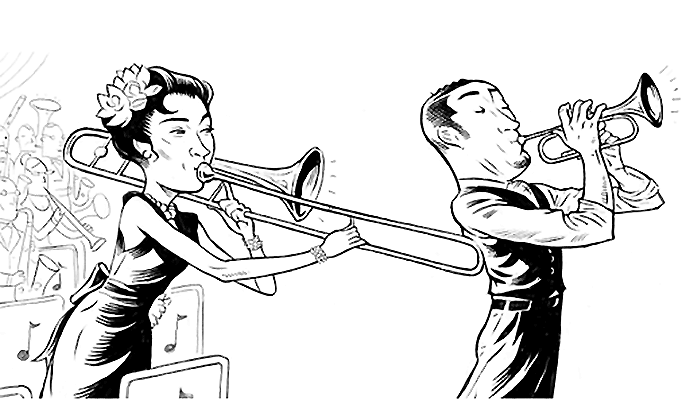Are You a Producer or a Performer?
Every successful business needs both high-potential producers and high-potential performers. Which one are you?

Most senior executives are not fully aware that the shape of their career depends on the type of leader they are. Some people are predisposed to being producers: They are skilled at conceiving new ideas and bringing them to market. Others are consummate performers: They know how to optimize the known systems and products of an organization, and how to make the most of existing practices.
You might have the urge to fill both roles at once. After all, anyone who can launch a new product must have some ability as a performer. Similarly, most skilled performers also have some producer talent.
But it’s rare for one person to excel as both a producer and a perfomer. So if you’re aware of what you do best, you can more easily establish yourself in the most suitable environment, with the right complementary people, and map out your ideal role. You’ll also know when to ask for help.
Is it better to be a producer or a performer? Neither. These two types of high-potential talent are highly complementary. While researching their book, The Self-Made Billionaire Effect: How Extreme Producers Create Massive Value, John Sviokla and Mitch Cohen spoke to more than 100 self-made billionaires. They found that the majority of these talented entrepreneurs created value as half of a producer–performer pair. Examples include Apple’s Steve Jobs (producer) and Tim Cook (performer); or John Paul Mitchell Systems’ John Paul DeJoria (producer) and Paul Mitchell (performer).
Every successful business needs both high-potential producers and high-potential performers. Which one are you?
You are invited to a strategy meeting to decide the priorities for your department/company for the coming year. You think the strongest contribution you’ll make is:
- A. Suggesting new opportunities based on current products and capabilities.
- B. Analyzing how to narrow strategic options down to the top two or three projects.
- C. Brainstorming how my company might go about pursuing opportunities.
- D. Actually, my contribution happens before the meeting, when I look at major upcoming issues and make sure we are framing the strategy conversation around them.
Results
You Have Not Yet Reached Your Potential
Both producers and performers are interested in exploring the boundaries of what is possible. Producers do it by pursuing new, at times audacious, goals. Performers do it by trying to bring their companies or division to the top reaches of success. Both types of high-potential talent feel a sense of urgency to improve themselves, their companies, and the circumstances they are in.
Right now, you are not driven by a strong desire for change. This doesn’t mean that you are lacking goals or ambition, but those goals are not focused on improving your company’s growth potential.
Expansion, increased efficiency, and incremental improvement, are the domains of performers, and they excel at them. Producers stand out at creating a brand new business, or reinventing an established business in the throes of disruption. Every successful business needs both high-potential producers and high-potential performers. Which would be the best role for you? Once you decide, you will be ready to move forward with your career.
You Are a PERFORMER
Performers are the top achievers within known, established systems. Performers usually got top marks in school, and get top reviews at work. In corporate environments, performers optimize the systems that a company has in place to ensure that a product, a service, a division runs at the top of its potential.
Performers work best when the parameters are clear. You struggle, however, when asked to come up with ways to operate in environments that are undefined or in the midst of disruption. You are the best choice for running a known business, and less at ease if asked to design a new business or invent something new.
Corporations favor your skills, so there will be no lack of opportunities for you to take a leadership role in existing businesses. If you have an entrepreneurial bent, pair up with a producer who has the ideas and the business model design skills that complement your operational excellence.
You Have PRODUCER POTENTIAL
You show a tendency to use the internal skills — what we call habits of mind — that producers apply to everything they do. They include:
- Empathetic imagination: seeing blockbuster potential in the needs and wants of others
- Patient urgency: operating simultaneously at multiple speeds and time frames
- Inventive execution: bringing together creative thinking and operational prowess
- Taking a relative view of risk: accepting immediate losses if they lead to a better future
- Leadership partnership: looking for others with complementary skills that enhance their own
However, you are also comfortable in the role of a performer, working in an environment where the parameters and rules of engagement are established.
Corporate environments need both producers, who have the ability to imagine entirely new products and business models, and performers, who can navigate known systems to optimize opportunities. Performer opportunities abound in business (and greatly outnumber openings for producers), so many people with producer potential get drawn into a performer mind-set. It is distracting to try to fulfill both roles; it is better to pick one approach, and look for a partner who can complement you.
If you want to see how far you can go as an innovator, try to get involved with a new opportunity at your company and approach it as a producer would. Question standard approaches to a problem. Imagine what different designs to the pricing or business model of a product might yield. Look for a performer who can help it get the recognition and support it needs to come to life.
You are a PRODUCER
Producers are innately innovative people who can conceive of new business ideas and bring them to fruition. They know how to assemble the disparate and sometimes conflicting business designs, resources, and talent that make new ideas successful in the market.
Producers are distinguished by a collection of internal skills — what we call habits of mind — that they apply to everything they do. These habits include:
- Empathetic imagination: seeing blockbuster potential in the needs and wants of others
- Patient urgency: operating simultaneously at multiple speeds and time frames
- Inventive execution: bringing together creative thinking and operational prowess
- Taking a relative view of risk: accepting immediate losses if they lead to a better future
- Leadership partnership: looking for others with complementary skills that enhance their own
These habits allow you to come up with ideas that are truly new. You may borrow elements from existing systems, but you are not constrained by “the way we’ve done things before.” On the contrary, your curiosity and knowledge allow you to see change long before it occurs. You perceive opportunities that your peers cannot.
But beware — producers who try to go it alone can be vulnerable; they may not get the support they need. Those who work inside an established company can become frustrated if their organization operates with less urgency than they think is needed. Some organizations may downplay producers’ talents or ideas, and favor instead safer endeavors that lead to slower growth.
If you are a producer, you will need to sell your ideas to the people with the authority to say yes. You will do more, faster, when partnering with people whose skills and knowledge complement yours.
Recommended Reading
What Self-Made Billionaires Do Best
They don’t just generate results. They produce breakthroughs.Align with Your Star Employees
When you connect the development of your top talent with the needs of your organization, everyone wins—and your best people stay. To assess how well you’re retaining your top talent, take our interactive quiz.
- s+b Blogss+b Blogs
Stop Driving Away Your Producers
Many companies undervalue their highest-potential talent: the leaders who create new businesses. - s+b Blogss+b Blogs
The Two Types of High-Potential Talent
The best leadership team contains both innovative producers and recognized performers. Unfortunately, many companies expect a single individual to fulfill both roles. For more related insights, listen to “What Makes Self-Made Billionaires Different.” - Podcast
What Makes Self-Made Billionaires Different
The unusual perspective of high-performing entrepreneurs allows them to turn good ideas into great businesses. - Podcast
Who Are Your High-Potential Employees?
By identifying your top talent and putting them in the right position, you’re increasing your odds of creating new businesses.









